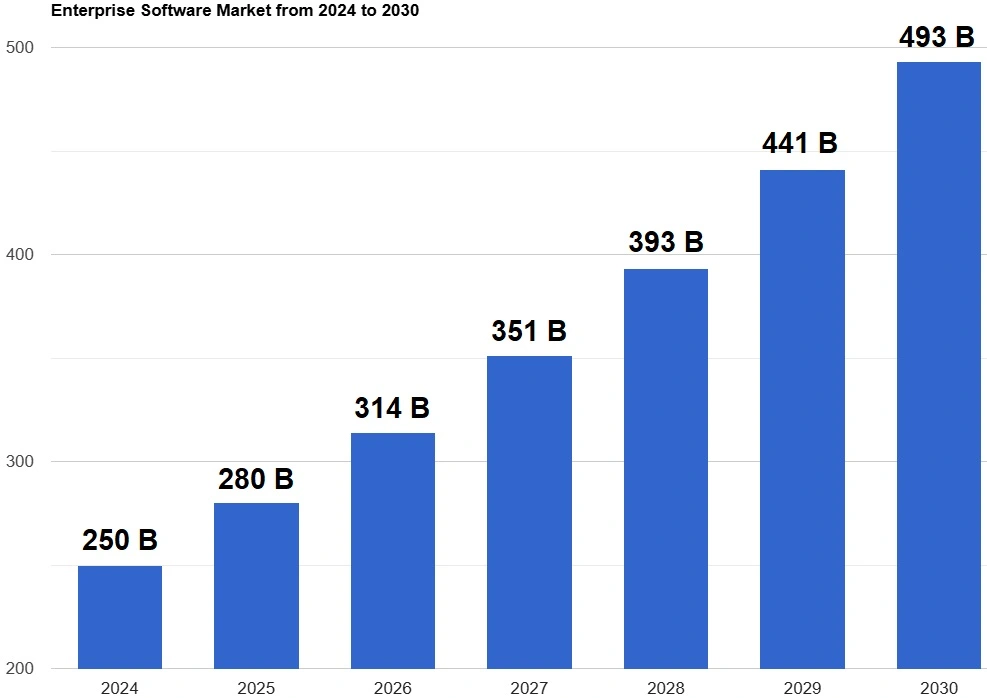The enterprise software market is experiencing unprecedented growth, reshaping how businesses operate in an increasingly digital world. As organizations strive for efficiency, agility, and competitiveness, the demand for advanced software solutions tailored to enterprise needs has surged.
Enterprise Software Market Analysis
The approximate decision of the Techgolly market research team is that the global Enterprise Software market was valued at least USD 250 billion in 2024 and is projected to reach up to USD 493 billion by 2030. Growth will continue at a compound annual growth rate (CAGR) of 10% to 12% from 2024 to 2030.

According to Research and Markets, the global Enterprise Software market was valued at USD 216.69 billion in 2022 and is expected to reach USD 517.26 billion by 2030. Precedence Research said the market size was USD 251.02 billion in 2024 and is projected to reach USD 761.71 billion by 2034.
Reasons for Enterprise Software Market Growth
As enterprises prioritize software solutions that enhance efficiency, productivity, and security, the market is poised to continue its upward trajectory. The compelling reasons driving the remarkable growth of the enterprise software market are discussed below.
Digital Transformation Imperative
The global business landscape is undergoing a digital transformation, with organizations across industries adopting technology to streamline operations, enhance customer experiences, and drive innovation. Enterprise software plays a pivotal role in this transformation, facilitating the integration of digital technologies, automation, and data analytics into business processes.
Remote Work and Collaboration
The COVID-19 pandemic forced a seismic shift toward remote work and collaboration. As a result, businesses sought software solutions that enable seamless remote communication, project management, and collaboration. Enterprise software, including video conferencing tools, project management platforms, and virtual team collaboration software, has seen surging demand.
Cloud Computing Advancements
The proliferation of cloud computing services has fundamentally changed how enterprises access, deploy, and manage software. Cloud-based enterprise software offers scalability, flexibility, and cost-efficiency, making it an attractive choice for businesses of all sizes. The shift from traditional on-premises solutions to cloud-based alternatives has significantly driven market growth.
Data Analytics and Business Intelligence
In today’s data-driven business environment, organizations are keen to harness the power of data to make informed decisions. Enterprise software that provides robust data analytics and business intelligence capabilities is in high demand. These tools help companies extract valuable insights from their data, enabling better strategic planning and improved operational efficiency.
Cybersecurity Concerns
With the increasing threat of cyberattacks and data breaches, cybersecurity has become a paramount concern for enterprises. The demand for enterprise security software, including endpoint protection, threat detection, and identity management solutions, has surged as organizations aim to safeguard their sensitive data and digital assets.
Artificial Intelligence (AI) and Automation
AI and automation reshape business processes, making them more efficient and productive. Enterprise software with AI-driven features like chatbots, predictive analytics, and robotic process automation (RPA) is in high demand. These technologies enable organizations to automate routine tasks, enhance customer service, and optimize operations.
Industry-Specific Solutions
Many enterprises require software tailored to their specific industries, whether healthcare, finance, manufacturing, or logistics. Developing industry-specific enterprise software solutions has driven growth as businesses seek tools that align with their unique needs and compliance requirements.
Global Expansion and Scalability
As businesses expand globally, they need software solutions that can scale seamlessly across geographies and support multi-language and multi-currency functionalities. Enterprise software that offers globalization features has become essential for organizations with international operations.
Regulatory Compliance
Enterprises face an ever-evolving landscape of regulatory requirements, from data protection laws like GDPR to industry-specific standards. Enterprise software that helps organizations maintain compliance by managing data privacy, reporting, and auditing has seen increased adoption.
Key Market Players
The major Enterprise Software vendors are Broadcom Inc. (CA Technologies, Inc.), Salesforce.com Inc., Epicor Software Corporation, Hewlett Packard Enterprise, IBM Corporation, Microsoft Corporation, Oracle Corporation, SAP SE, Sage Intacct Inc., SYSPRO, and Zoho Corporation Pvt. Ltd.
Conclusion
The enterprise software market is on a robust growth trajectory, fueled by the rapid pace of digital transformation, the adoption of cloud computing, and an increasing emphasis on data analytics, cybersecurity, and automation. As businesses expand globally and confront complex regulatory requirements, the demand for adaptable, secure, and industry-specific software solutions will persist. Major players like Microsoft, IBM, Oracle, and SAP are well-positioned to drive innovation and meet evolving enterprise needs. This ongoing expansion underscores the critical role of enterprise software in enhancing operational efficiency, supporting remote work, and empowering data-driven decision-making, shaping a more agile and competitive business landscape for the future.





